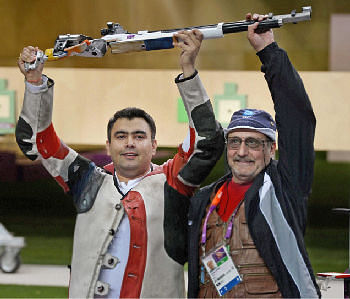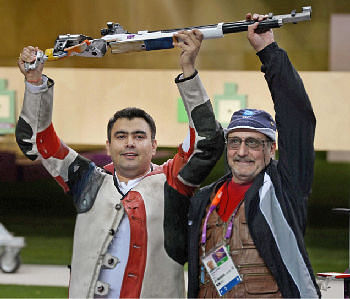
Lessons from London 2012: Coach the Coaches

With two more wrestlers biting the dust yesterday, India is now pinning its hopes on India’s flag bearer for the London Games, Sushil Kumar to lead from the front in the wrestling ring. Kumar has a chance to rewrite the history books when he enters the ring tomorrow. No Indian athlete has ever won back-to-back medals at the Olympics in the individual event.
With attention of fans slowly shifting towards Cricket (with news coming out of swashbuckler Yuvraj Singh making a comeback to the Indian team for T20 world cup), there has been a dull din, growing louder over the past few days in the social media with respect to our Olympic campaign. A late spark from either Kumar or Dutt can bring the nation back together cheering for the Olympic sports. Currently lying outside top-50 countries on the medals table, India will be hoping for that elusive gold from the two to finish on a high and improve on its Beijing performance, where we finished on the 50th spot.
Coming to the lessons from our London performance, a closer look at the sport that fetched us medals tells an interesting story. We have so far won two medals in Shooting and one each in Badminton and Boxing. Apart from Badminton where our coaches were indigenous-led by a great mind, Pullela Gopichand, both Shooting and Boxing medals were courtesy foreign think-tank. In fact, in Shooting, out of the five coaches that assisted the team, four of them were from the foreign shores. While Vijay Kumar’s silver success has been credited to the Russian coach Pavel Smirnov, Gagan Narang has said that Kazakh coach Stanislas Lapidus had a huge role in his bronze medal winning effort, as he made him mentally tougher. Similarly, in Boxing, Mary Kom‘s training was done under the guise of the American coach, Charles Attkinson. Yes, we have outstanding national coaches in Sunny Thomas (Shooting) and Gurbaksh Singh Sandhu (Boxing), but the reality is we are heavily reliant on foreign expertise for our sporting success.
In India, if you are an ex-international or a national player, you have an automatic license to become a coach. Qualifications matter little in our sporting set-up, if you are a good sportsperson our system accepts you as a good coach. Those who pursue a degree or a diploma in coaching from National Institute of Sports do so to become eligible for state and central government jobs, not because they seek improvement in their skill-set. Last month, I met one of the coaches working with a state federation who asked me to help him rewrite the paragraphs he had verbatim lifted from a sports coaching website that can be inserted in a program he has made for athletes. I was not shocked but surprised by his open embrace of cut-copy-paste production.
Our coaches need education, some of them I spoke to don’t even understand the meaning of plagiarism. Many of the coaches I have spoken to in the last few months told me how they used the social media to learn drills from the videos uploaded on the world wide web, though very few of them had understanding of how these drills will help athletes better their skills. I was speaking to ex-chief of Lakshmibai National University of Physical Education (LNUPE), Gwalior, on what can be a possible solution to this problem. He said that unless we have a provision for regularly evaluating and strengthening our coaching courses, we will continue to raise outdated coaches.
For coach development in our country, we need to introduce a system that makes coaching qualifications mandatory and licenses are issued to coaches that need to be renewed from time-to-time. This will ensure that coaches are updating their knowledge regularly. Coaches are unsung heroes and a vital cog in sport development at the grassroots. For India to become a sporting power, coaching the coaches, for now, should be our priority and the first step forward towards our pursuit of sporting excellence.
By Aman Dhall
(The author is Co-founder & Partner, Pro4Sport Solutions, a high-performance coaching firm that trains young athletes in the sport of Basketball, Cricket, Football and Table Tennis)